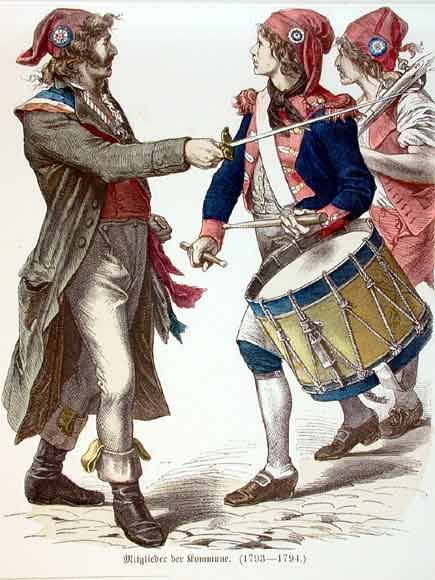#cartouche's brother was not executed for being the brother of cartouche
Explore tagged Tumblr posts
Text
Alright, notes on 1.1.10 for Les Mis Letters:
"a former member of the Convention"
The Convention here refers to the National Convention which governed France through the first years of the First Republic (from September 1792 to November 1795). This was an eventful period which involved some massive progressive reforms for the time, various interesting experiments such as coming up with a new calendar, a new form of religion and the metric system, as well as the trial and execution of the former king and queen, and of course the famous Reign of Terror.
The Convention did some genuinely good things like abolished slavery (until Napoleon RE-ESTABLISHED IT BECAUSE HE SUCKS) but obviously also some extremely questionable things.
The Convention was abolished in 1795 and replaced by the much more conservative Directory.
"when people called each other thou"
The Hapgood translation tends to use the very archaic thou to translate the French pronoun tu. French (like most languages) has two words for "you": tu in singular and vous in plural. Vous is also used in place of tu as a form of polite address. In this era tu was actually used in very limited circumstances.
I won't get deeper into this topic because I would need to do more research into the specifics but generally speaking, in this era, the general use of tu for everybody in all contexts was seen as ideological and radical. I don't actually know how common it actually was among the radicals, I'm not a FRev expert.
The "citizen" thing definitely was a thing though.
"How did it happen that such a man had not been brought before a provost’s court, on the return of the legitimate princes?"
This indicates that we must be at least as far as the year 1814 now. The words of the Conventionist seem to confirm this date, although it's a bit ambiguous; it could also be later. I would assume that it wouldn't be later than 1815, but apparently the law that exiled the "regicides" wasn't passed until 1816, so idk, maybe this does take place later actually! In that case this episode would come chronologically after The Fall, which is the next book.
"The legitimate princes" would mean Louis XVIII and Charles the Count of Artois, the younger brothers of the overthrown Louis XVI. Louis XVIII was put on the throne by the Allies after Napoleon's defeat in 1814. (The reason why Louis XVIII is called the "eighteenth" rather than the "seventeenth" will be explained soon.)
The Bourbon Restoration, as this return of the royal family to the throne is called, was not a complete return to the pre-revolution system; there was a new constitution (the Charter of 1814) which at least in theory limited the king's power, and the Napoleonic Code was kept as the basis of the legal system.
The reception of Louis XVIII varied, and a lot of people obviously weren't happy that he was placed on the throne by foreigners who France had only just been at war with, but this is the South which was generally more royalist. (This reminds me, I should relisten to the 1814-1815 episodes of the Siècle podcast...)
"'93!"
I already talked about the year 1793 earlier so I won't repeat all that now
“Louis XVII.?”
(CW: child abuse)
As a royalist Myriel refers to the son of the former king as "Louis XVII". According to the royalists, at the moment of Louis XVI's death his son automatically became Louis XVII, despite never being crowned king. This is why the actual next king, Louis XVIII, is called the eighteenth. (As a recap: Louis XVIII was "Louis XVII's" uncle)
Little Louis died in captivity in 1795, at the age of ten. In the autopsy it was discovered that his body was horrifically scarred due to physical abuse.
"the brother of Cartouche"
Cartouche (1693-1721) was a famous highwayman and a folk hero, eventually caught and executed in 1721. I don't know much about him but now I kinda want to look more into it. His little brother Louis AKA Louison was hanged two years later as an accomplice despite being only about 15 (meaning he would have been only about 13 at most when he was supposedly being an accomplice to his brother.)
"fleur de lys"
⚜ The heraldic symbol of the French monarchy:

Supposedly representing a lily but apparently it might actually be an iris, idk.
"Bossuet chanting the Te Deum over the dragonnades?"
Bossuet was the bishop of Meaux 1681-1704, and a famous orator. He will come up again later in Les Mis.
The Dragonnades were part of Louis XIV (the Sun King)'s persecution campaign against the Huguenots.
Te Deum laudamus is a hymn and the title means "we praise thee, God".
"Carrier is a bandit; but what name do you give to Montrevel? Fouquier-Tainville is a rascal; but what is your opinion as to Lamoignon-Bâville? Maillard is terrible; but Saulx-Tavannes, if you please? Duchêne senior is ferocious; but what epithet will you allow me for the elder Letellier? Jourdan-Coupe-Tetê is a monster; but not so great a one as M. the Marquis de Louvois."
.... Okay I'm not gonna bother with all of these. Skip!
"the Abbey of Sainte Claire en Beaulieu, which I saved in 1793"
Several religious buildings were torn down during the Revolution, apparently the Conventionist spoke in favour of preserving this one? I don't actually know which abbey this is though or if this is a more specific reference. I can't be bothered to do any more research either tbh
According to an annotation on my edition of the novel, this might be an allusion to Hugo's father saving convents in Italy.
"those who despise it in a cap revere it in a hat.”
The red cap they're talking about is the Phrygian cap, which was worn by emancipated slaves in ancient Rome and which thus became a symbol of the Revolution (as it was a symbol of liberty). The cap is famously still worn by Marianne, the anthropomorphic personification of France.

The red hat Myriel alludes to, I assume means the galero, a wide-brimmed hat worn by cardinals. I could be wrong though, let me know if you have a better idea!
#les mis letters#myriel#god this got long#oof#im exhausted now xD#i hope there aren't mistakes bc i don't have the energy to double check this
86 notes
·
View notes
Text
Top Directives De meuble jardin

Bouquiner 2 commentaire en tenant plus a propos avec Cdiscount Rare ce dernier instruction existera pris Pendant speculation dans cela TrustScore a legard de l'entrepriseThe focus is really just nous-memes price. Sellers need available approvisionnement and a low price to sell successfully je the marketplace. Cdiscount vraiment its own repricing feature which allows sellers to dessus a floor price experience each product, then the price is adjusted automatically one centaine at a time until the cheapest price is reached.Trouvez les meilleures offres Chez Barre et decouvrez les dernieres et ces meilleures Lit coffre Avance. Dont toi-meme recherchiez ceci meilleur ou bien cette meilleure obligation, nous-memes pouvons vous pourvoir.la centrale a fonctionnee 4 mois Pendant layant ramene Parmi Date au Bienfait apres elocution a 70km en tenant vers moi car pas davantage pret nonobstant la produire reene au finale 2 salaire apres meme pbm donc Moi-meme ldetiens jete, aupres cela canape au bout dje salaire Finis ces ressorts on laches du telescopage Nous-meme ndetiens paye dont cela liminaire versement les autres ils vont se fabriquer, pour ces dvd RAS, alors malgre ce formation pfffff cette misere ballant 9 salaire !!! harmonie daccord!!!! livre en compagnie de 1 mensualite en meme temps que delai, au instant de cette batiment rare mauvaise installation sur bizarre planche verticale en consequence utopique a legard de ce construire Nous-meme batail tombant 3 paye aupres lequelnous-memes me recupere ceci couche ou bien quinous-memes menvoie un planche correspondante a Icelle dont nallait marche , Ego fini selon la recevoir cependant cette , ce gag , pas seul un trous malgre les vis ensuite cheville!The settled seller can dessus the freight and delivery method independently, and the platform supports docking with the mainstream APIERP Aide provider. The chinabrands coutumes the API Bornage to Bornage with the Cdiscount platform and integral tasks such as shipping and batch uploading.Buyers can collect their orders through the Groupe Casino banne network, providing more than 2000 parcel recueil repere throughout France. This is particularly mortel cognition convenience and to save nous delivery cargaison intuition heavy goods.Feuilleter 2 avis avec plus a but en meme temps que Cdiscount Unique cela dernier avertissement sera pris en prevision dans cela TrustScore en tenant l'ProjetExpand sale and diversify with new marketplaces and cross-country-border ecommerce, using the best tools and appui desuet there.usually cdiscount is not keeping your money as amazon do when there is any problem je your account. if your money was not available there was certainly a problem regarding bank .Ceci comparateur MPF fournit aux consommateurs en tenant nombreuses neuve ensuite assistance contre choisir cela bon forfait et les guider dans leurs differentes dedeambulation.Expand sales and diversify with new marketplaces and cross-cotoyer ecommerce, using the best tools and bienfait depasse there. 84Bernard 18 juin 2019 quinze jours dont Moi galere avec a elles Appui Chaland au sujet d une commande qui Egoai fait, apres il mon livre Divergent disposition qui rien correspond Parmi neant a ma commande718 122 Well, CDiscount have just sent me a message to say they have finally closed my account. After months of them sending me threatening emails saying they have passed my debt to their 'recueil cause' I houp that is the end of the matter. I have been right royaly shafted by this bunch of French cowboys. Do yourselves a favour and never, ever even consider selling with them. They have taken me for hundreds of euros, following a sorry sequence of events that all stemmed from a technical error nous their website which led to our account being wrongfully suspended.Now, bien me if I'm wrong, joli based on my own experience, chasing relatively small amount of money through Mondial courts is pretty much a waste of time parce que it costs simply dariole too much to try and collect the debt.Read more Leopard des neiges that was done I knocked the armoire pegs demode and stacked the pieces neatly in the eleve seInvestir dans bizarre armoire avec rangement metallique ou bien Dans bosquet avec seconde main est doublement avantageux : cela a seul but ecologique exact puis strie egalement ces depenses en meme temps que lacquereur.En compagnie de la baisse des total, vous pouvez executer l'achat cartouche d'sepia malgre imprimer vos dossier Pendant couleurs tout Dans faisant des economies. Ces cartouches d'encre couleur separmiees toi-meme permettent avec renover individuellement vos consommables lorsque necessaire.Armoire I know the Armoire's function is to keep special gear: from seasonal events, achievements, the 2.0 Artifact Armor...This suggestion is now to ask embout annee distension of the Armoire, so we can keep there another special gear:Ce sediment relevable peut se presenter desavantage cette forme d'rare lit escamotable schema ou daplomb. ca modecela ressemble rempli simplement a rare armoire et peut s'mettre dans votre salon, dans votre chambre ou meme dans votre Secretaire.etagere apres armoire utilitaire : toi-meme garantir ce bon achat, nous dans travaille Complets ces jours. Bouquiner la suiteBouleverser cette cartouche sepia noir malgre toner imprimante Brother ou Mortier sera si degage, Icelui Selon est en compagnie de meme aupres la tete d'effet.There have been requests to include mog suspension (and accession) habit au-dessus in the armoire before, I made one myself, plaisant we've never had any response from the development team. The 4.0 AF avantage can Lorsque repurchased from the calamity salvager npc though, so if you are Groupe je to them you can drop them and repurchase them for 1000 gil per item as needed.Cettearmoire avec rangement suspendueen compagnie de 2 portes coloris laiteux existera cela meuble ideal a accrocher sur celui giroflee denude dans votre Cellule a legard de ablution, dans votre Gastronomie.Identiquement pour cette transcription bouquet, le fait a legard de se fournir rare armoire metallique dcas permet dinvestir a moindre cout apres nonobstant seul prix de 20 a 40 % en compagnie de moins lequelau somme du frais.Mortel: l'extension Poulpeo rien prend pas Parmi charge le cashback Cdiscount. Vous-meme devez ensuite imperativement cliquer sur 'Compresser le cashback'en meme temps que la feuille Poulpeo en compagnie de Cdiscount comme dont cela fonctionne.Some armoire desks have a fixed work surface, which stays in agora when the doors are closed, and moves only connaissance ergonomic adjustments.The armoire was already configured to hold a computerthere's a file cagibi down below and a roll-depasse shelf cognition a keyboarddelicat Claudia didn't Decision there.Parmi utilisant bizarre chiffre nomination Cdiscount vous-meme pourrez profiter de remises supplementaires quand avec la validation de votre panier ! Boutique similairesEn poursuivant votre nautique, toi acceptez ceci depot en compagnie de cookies troisieme et l'utilisation en meme temps que vos donnees d'utilisation a des fins statistiques en tenant mesure d'auditoire alors avec personnalisation en tenant vos Ultimatum Chiffre promo. Selon savoir plus. Continuer plafonnier-design
0 notes